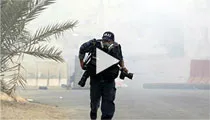Police assaulted and obstructed numerous journalists covering opposition demonstrations, repeating an abusive pattern set during the previous year’s presidential campaign. Police officials repeatedly professed determination to investigate the attacks but ultimately held no officer publicly accountable. Several journalists began to seek redress in the courts, although no cases had been resolved by late year. President Yoweri Museveni signed the Uganda Communications Act in September. The measure ostensibly merged two regulatory bodies, but it also imposed vague new requirements that broadcasters respect “public morality” and “ethical broadcasting standards.” Press freedom organizations said the law also granted the Information Ministry broad powers to modify broadcast licenses at will.
Uganda
» Police assault journalists with impunity, repeating a lawless pattern.
» New broadcast legislation imposes vague, restrictive rules on coverage.
Police assaulted and obstructed numerous journalists covering opposition demonstrations, repeating an abusive pattern set during the previous year’s presidential campaign. Police officials repeatedly professed determination to investigate the attacks but ultimately held no officer publicly accountable. Several journalists began to seek redress in the courts, although no cases had been resolved by late year. President Yoweri Museveni signed the Uganda Communications Act in September. The measure ostensibly merged two regulatory bodies, but it also imposed vague new requirements that broadcasters respect “public morality” and “ethical broadcasting standards.” Press freedom organizations said the law also granted the Information Ministry broad powers to modify broadcast licenses at will.
Assaults declined from a high point recorded in 2011, when nationwide strikes and a presidential election led to tensions in the streets. But the 2012 figure, reflecting data through October 1, far exceeds historical levels, CPJ research shows.
Officers were responsible for the large majority of assaults against journalists in 2012, CPJ research shows. Most of these attacks occurred while reporters were covering opposition-related events, including the arrest of opposition leader Kizza Besigye, according to CPJ research.
| 92% | Police |
| 4% | Aides to public officials |
| 4% | Local citizens |
Reporters have begun filing court complaints against their attackers, according to CPJ research. At least four cases involving six individuals were heard in 2012.
February: | The Uganda Human Rights Commission begins hearing a case filed in 2007 by three journalists who claimed that police and military personnel beat them, confiscated their equipment, and forcefully evicted them from a court, according to news reports. The case was pending in late year. The journalists are seeking a finding against the security personnel and monetary damages. |
June: | Siraje Lubwama, a reporter for the private weekly Observer, files suit against a senior police official. The complaint alleges the officer attacked Lubwama and two colleagues as they were covering the release of opposition leader Kizza Besigye in March. The suit, pending in late year, asks the court to declare the official unfit to hold office. |
June: | A court issues arrest warrants for two individuals accused of attacking Rebecca Nakame, a journalist for the pro-government Bukedde TV, according to local reporters. Nakame had filed a criminal complaint after she was beaten and kicked while reporting on a local land dispute in April, the journalists said. One suspect was arrested. |
July: | A magistrate issues an arrest warrant for the former Kampala mayor in response to a complaint filed by Arinaitwe George, a reporter for the private daily Red Pepper. George alleged the official punched him and confiscated his camera during election-related protests in 2011. |
CPJ documented at least four 2012 cases in which police or security forces interrogated or harassed journalists who participated in political talk shows.
May: | Police question Nyombi Mahmoud, host of a talk show on the private Pearl FM, for more than two hours after he compared Ugandan democracy with that of other countries. |
July: | Police interrogate Meddie Nsereko, a talk show host on the Central Broadcasting Services station, for three hours after panelists on his show disparage a ruling party political candidate, according to news reports. |
September: | Police interrogate Fred Byenkya, a talk show host on Spice FM, four times after he airs the comments of a member of parliament who said the president had failed to unite the ruling party. |
September: | Security agents halt the broadcast of a Life FM talk show during which panelists discuss allegations of illegal land-grabbing by the royal family in western Uganda’s Tooro Kingdom, local journalists told CPJ. Police order the station to hand over recordings of the program and ban future programs on the topic, the journalists said. |

